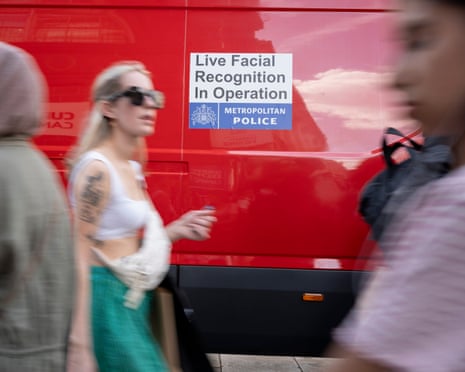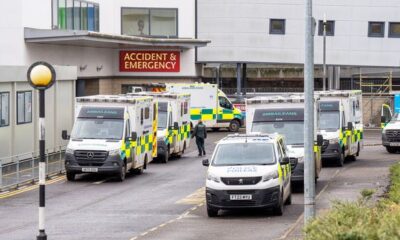Science
Expert Challenges Met Police’s Claims on Facial Recognition Bias

The Metropolitan Police Service’s assertion that its live facial recognition (LFR) technology is free from bias has been challenged by a leading expert in the field. Professor Pete Fussey, who conducted the only independent academic review of police facial recognition practices, criticized the Met’s claims as unsubstantiated. This scrutiny comes as the police prepare for a significant deployment of LFR during the upcoming Notting Hill Carnival in west London over the bank holiday weekend.
The Met plans to use LFR at two locations near the carnival, despite opposition from the Equality and Human Rights Commission, which has deemed the police’s use of LFR unlawful. Fussey’s insights add weight to concerns surrounding the technology’s implications for civil liberties and public safety.
According to the Metropolitan Police, a study conducted by the National Physical Laboratory (NPL) in 2023 supports their claims of bias-free implementation. However, Fussey argues that the study’s findings do not support the police’s position. He stated, “The claims the Met are making about the absence of bias from the NPL report are not substantiated by the facts in that report.”
The NPL’s research indicated that the sensitivity settings of the LFR system could significantly impact its effectiveness and bias levels. A more sensitive setting increases the likelihood of detecting individuals but also raises the risk of biases linked to race, gender, and age. The report identified bias at a sensitivity setting of 0.56 and noted that false positives occurred at 0.6, with all incorrect identifications involving individuals from ethnic minority backgrounds.
The study analyzed over 178,000 images as part of its testing, with volunteers passing by cameras approximately 10 times each, generating around 4,000 opportunities for accurate recognition. This testing took place in crowds estimated to exceed 130,000 at various locations across London and Cardiff, under sunny conditions for a total of 34.5 hours.
While the report concluded that there was no statistically significant bias at settings of 0.6 or higher, Fussey asserted that the sample size was too small to validate such claims. He noted, “The MPS [Metropolitan Police Service] consistently claim their system has been independently tested for bias. Examining this research reveals the data is insufficient to support the claims being made.”
Currently, the Met operates LFR at a sensitivity setting of 0.64, which the NPL study claimed produced no false matches. Fussey stated, “According to their own research, false matches were not actually assessed at the settings they claim is free of bias, which is 0.64 or above.” He emphasized that reliance on a small sample size to make broad claims about bias is statistically weak.
The police’s director of intelligence, Lindsey Chiswick, defended the Met’s practices. “This is a factual report from a world-renowned organisation,” she said. “When we use LFR at the setting of 0.64 – which is what we now use – there is no statistically significant bias.” Chiswick explained that the study aimed to identify potential biases in the algorithm and that the Met has adjusted its practices accordingly.
As the Notting Hill Carnival approaches, the police plan to place warning signs indicating the use of LFR near the camera vans, which will connect to a database of wanted suspects. Officials believe that this strategy will act as a deterrent to potential criminal activity. Additionally, retrospective facial recognition will be employed during the event to identify suspects involved in violence or assaults.
Fussey acknowledged the importance of police technology for public safety but stressed the need for accountability and adherence to human rights standards. “Few would doubt the right of police to use technology to keep the public safe, but this needs to be done with proper accountability measures and in accordance with human rights standards,” he remarked.
The Metropolitan Police has reported that since 2024, the LFR system has maintained a false positive rate of one in every 33,000 cases. Although the Met declined to specify the total number of faces scanned, estimates suggest it is in the hundreds of thousands. In 2024, there were 26 false matches, with eight recorded in 2025. The police clarified that none of these individuals were detained, as the decision to arrest is made by officers following a computer-generated flag.
In preparation for the carnival, the Met has arrested 100 individuals, with 21 of them recalled to prison and 266 banned from attending the event. Additionally, they have confiscated 11 firearms and over 40 knives in their efforts to ensure public safety during the festivities.
-

 World2 days ago
World2 days agoCoronation Street’s Shocking Murder Twist Reveals Family Secrets
-

 Entertainment4 months ago
Entertainment4 months agoKate Garraway Sells £2 Million Home Amid Financial Struggles
-

 Entertainment3 months ago
Entertainment3 months agoAnn Ming Reflects on ITV’s ‘I Fought the Law’ Drama
-

 Health3 months ago
Health3 months agoKatie Price Faces New Health Concerns After Cancer Symptoms Resurface
-

 Entertainment3 weeks ago
Entertainment3 weeks agoCoronation Street Fans React as Todd Faces Heartbreaking Choice
-

 World3 weeks ago
World3 weeks agoBailey Announces Heartbreaking Split from Rebecca After Reunion
-

 World5 days ago
World5 days agoKevin Sinfield Exceeds Fundraising Goal Ahead of Final Marathons
-

 Entertainment3 months ago
Entertainment3 months agoCoronation Street’s Carl Webster Faces Trouble with New Affairs
-

 Entertainment5 days ago
Entertainment5 days agoTwo Stars Evicted from I’m A Celebrity Just Days Before Finale
-

 Entertainment3 months ago
Entertainment3 months agoWhere is Tinder Swindler Simon Leviev? Latest Updates Revealed
-

 Entertainment4 months ago
Entertainment4 months agoMarkiplier Addresses AI Controversy During Livestream Response
-

 Science2 months ago
Science2 months agoBrian Cox Addresses Claims of Alien Probe in 3I/ATLAS Discovery










